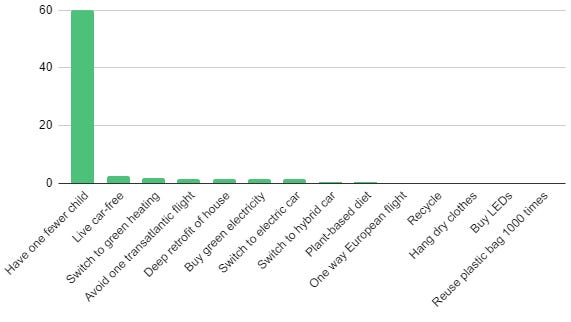Spaceship Earth
Are resources limited? Do the fittest survive? It's time to take The Sniff Test.
No More Children
In 2018 Blythe Pepino attended a lecture held by Extinction Rebellion. Shocked by what she heard, Pepino co-founded BirthStrike. This is a movement of people deciding not to have children due to the severity of the ecological crisis.
It’s perverse to battle the risk of extinction by doing the one thing that guarantees it. Yet people do protest about the world in ways that hurt themselves. The film Dumb Money captures the financial nihilism of thousands of young Americans who despair of achieving the American Dream.
The hope is that if enough people protest then someone will take notice. Who?
Three Bad Ideas
The Founders Forum believes entrepreneurs are uniquely placed to transform the world. It has almost 2,000 members from 40 countries with a concentration in the US, UK and Germany. Its charity, the Founders Pledge, helps these technology entrepreneurs direct their donations.
This is a change from climate activists demanding governments do something. If you believe that industrial society is self destructive then you are drawn to anti-capitalism. This aligns you with those whose primary motivation may not be ecological. BirthStrike refuses to procreate until humanity has resolved its own “social / environmental / economic issues”. That’s going to take a while.
All movements require arguments. In turn, these require data and an appeal to popular science, much of which is misguided. Three of the most common errors are Spaceship Earth, the purpose of science and the survival of the fittest.
Spaceship Earth
Kenneth Boulding created the image of spaceship earth almost 60 years ago. The idea is that our planet is uniquely setup to support life. Humans are the only species whose actions undermine nature.
Boulding was an academic economist who likened industrial society to a “cowboy economy”. The herd grazes a patch of land until it is fallow and moves on. As the earth is finite, the herd runs out of grass.
This argument relies on extrapolation of existing trends. This is an error many make based on a misunderstanding of science. But there is a more basic reason why it is wrong.
It’s cold outside. Without shelter from clothing, housing and heating, I would not survive. Everything around me is the earth’s bounty moulded to protect me.
Earth is not a finished spaceship. It is a factory in which the raw materials for survival are lying around. Without humans these materials are useless.
99.9% of all species that every existed are extinct. This is not due to humans causing climate change. Every species bar one survives in a certain environment and perishes when it changes. They cannot adapt.
Humans can and do. As such, we are unique and not just on earth. To the best of our knowledge we are alone in the universe. But as we have little knowledge of the trillions of galaxies, it would be foolish to be certain in this belief.
Opponents of space travel say we mustn’t go to Mars because we’ll disturb the local environment, bringing disease and destruction. But there is nothing to destroy. Mars is a giant heap of raw materials from which we will build the next steps in our conquest of the solar system.
The essence of life is replication, from which the false doctrine of survival of the fittest has emerged. There may be life on Mars, but it will not be capable of adapting its environment. Hence, like all species on earth bar one, its destiny is extinction.
The vastness of space is for us to explore once we acquire the knowledge. David Deutsch titled his seminal work “The Beginning of Infinity” in recognition of this.
The Purpose of Science
The headline grabbing “science” of Founders Pledge says not having children is the most impactful thing humans can do to reduce emissions.
There is a lot wrong with this data. For example, why compare a lifetime without children to taking one less flight? But at a high level the argument is correct. Going extinct does remove the footprint of a species.
Another issue with the data is that existing policies reduce most of the negative consequences of living. The exception is switching to electric cars, where government intervention makes things worse. But this is no more cause for hope, than having no policies is reason for despair. Both rely on the error of extrapolation.
Many people, including scientists, believe that the purpose of science is to predict the future. But this is a by-product of the real purpose, which is to solve problems.
Predictions use the best of our current knowledge. What we know improves as we get better at explaining. If we knew what we will know, then it would already be known. Hence we cannot use what happens in the future in our predictions.
As a result, predictions are likely to be wrong. The more complicated the theory on which they are based, the more likely an error. Climate science is complex.
Extrapolating current conditions to predict a catastrophe fails to take account of what we will know. Policies such as net zero might focus resources on improving the relevant knowledge. But there is a more powerful force at work.
Genes and Memes
There are two sources of knowledge. The first is evolutionary and is stored in genes. These are replicators and under particular conditions make exact copies of themselves.
The second type of knowledge is explanatory. This develops under certain conditions, such as those that allow free speech and critical thought. Knowledge is replicated when it passes between us.
Only humans derive explanatory knowledge. This is because it begins with conjecture, which is an unexplained feature of consciousness. Theories are created, criticised and tested before becoming knowledge.
Explanatory knowledge travels much faster than evolutionary. This is because criticism and testing speed up the process of creation. Evolution is reliant on mutation and trial and error. This is slow by comparison.
Knowledge is not the only replicator. Computer viruses copy themselves, while the knowledge they contain belongs to the programmer. Jokes and conspiracy theories also replicate. Richard Dawkins coined the term meme for such ideas.
Memes are a result of human creativity which, as with conjecture, is an unknown process. They are not knowledge but can pass as it. Given their simplicity compared to say, trigonometry, memes travel rapidly.
Does it make sense to compare a joke, or an argument for having fewer children, with the theory of evolution? It does when you allow for a misunderstanding of the theory. This misconception is known as survival of the fittest.
Neo Darwinism
Dawkins introduced memes in his 1976 work “The Selfish Gene”. In this, he explained that successful genes were those that were replicated. This requires the right environment and cooperation with a host of other genes. Often these are grouped in what we call organisms.
The genes that replicate best, do not do so for the benefit of the host organism. They do not copy for the greater good of the species. Fitness for survival is an abstract concept with different meanings.
For example, are the smartest, best looking or most convivial humans more likely to pass on their genes. Perhaps it’s those making the most money. If so, short-term gains at the expense of the planet might be hard-wired into our DNA.
Capitalists use survival of the fittest to say that short-term profit seeking adapts to changes in customer behaviour. If more customers want sustainable products, then they will be made. The private sector is motivated to solve the climate crisis.
Anti-capitalists ask where is the evidence for this. The science may be on their side. After all, not all successful genetic mutations deliver benefits to a species.
David Deutsch provides the example of a colony of birds. Breeding conditions are optimal in April and the birds evolve to mate at that time. There is competition for nesting sites and the highest number of breeding pairs are supported in April.
A mutation creates birds that mate in March. As the weather is cooler, it is sub optimal for the species. But the early breeders have the choice of nesting sites and the best chance of passing on their genes.
Competition drives the birds to mate earlier in the year. Fewer pairs survive the colder climate, but the selfish genes in the surviving pairs do not care. They exist only to replicate themselves.
We can debate whether the methods of Extinction Rebellion and BirthStrike work, but do they have a point? Are we driven by our selfish genes to maximise the short run, regardless of long-term consequences. This would require heavy intervention to prevent a climate crisis.
Bad ideas may spread like wildfire for no other reason than they are easy to copy. Which is the bad idea – that there is a climate crisis, or that profit maximisation benefits humanity?
The Selfish Meme
Governments in the West follow the principle of letting people get on with things unless they are harmful to others. We have laws against murder, theft and certain types of pollution. Environmentalists want more laws limiting economic activity.
There was a rush of banks to sign up for net zero pledges around the 2021 COP Summit in Glasgow. But banks have not stopped funding fossil fuels.
The reason is they cannot stop. Banks make money from funding investments and heavy industry requires the most investment. Sectors such as mining, energy, steel and cars are among the most polluting.
Stopping funding fossil fuels would condemn emerging economies to never emerging. Here is a list of countries most vulnerable to environmental lending policies.
Economic growth is a result of population expansion and increased productivity. The BirthStrikers aim to stop population growth for long enough that governments are forced to react. But which comes first, slower growth due to fewer babies or climate catastrophe? There must be a faster way of achieving their aims.
Productivity is a result of investment. It aims to produce more stuff with fewer resources. This requires energy, and fossil fuels remain its primary source. There is no growth without pollution.
At this point campaigners shout “precisely”. But humans are not going to stop seeking growth. The West offsets slow birth rates with immigration. BirthStrike’s protest goes unnoticed.
The solution to adverse climate change is continued growth directed by governments in a sustainable direction. This requires more knowledge, which means more theories and more testing. This needs more energy.
The Spaceship Earth theory argues that resources are finite. Human’s ability to adapt says the opposite. Continued adaption requires open society, investment and limited authoritarian intervention.
Raising awareness is an effective way of changing both government and consumer behaviour. Protests have a point. But stopping doing what works to advance human knowledge is bad science born of a selfish meme.








David Deutsch's critique about 'Spaceship Earth' is another of his genuinely important insights. As he says, left to itself, the Oxfordshire countryside would kill David Deutsch in days probably, weeks certainly. It is only because of humanity's ability and willingness to adapt that allows us to survive earth.